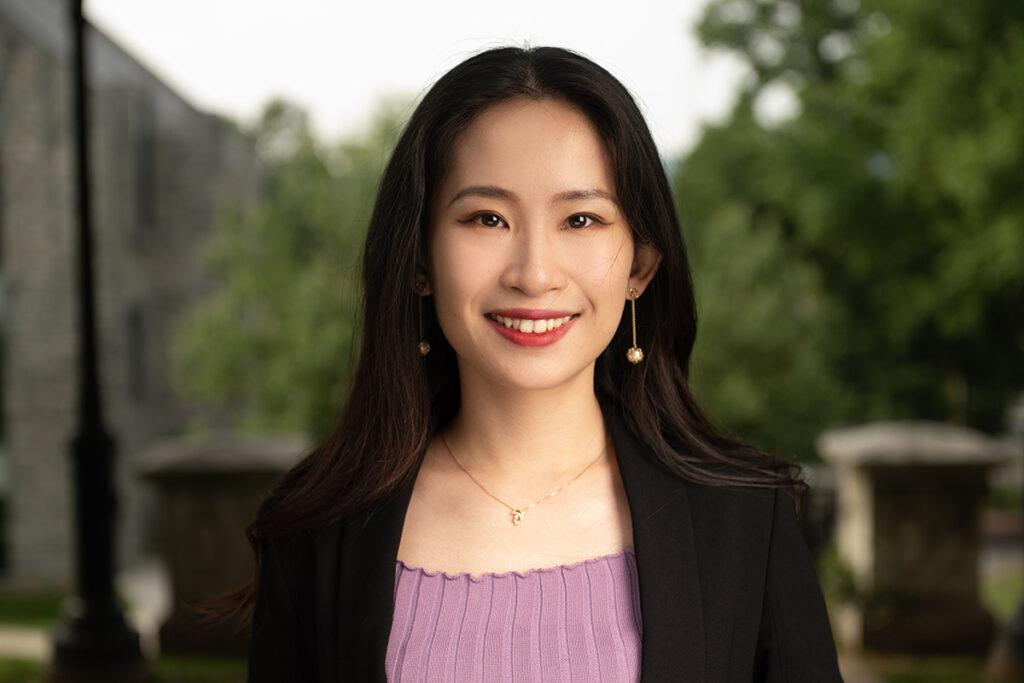Highlighting our faculty
- Faculty at Lafayette College are renowned leaders in their respective fields, exceptional teachers and dedicated mentors. Read more about our faculty.
Meet Yueyi (Diana) Sun, assistant professor of mechanical engineering

What I study and why: My academic pursuits are deeply rooted in fluid mechanics, biomechanics, advanced computational modeling, complex fluids, and soft matter. Within these fields, there are many interesting macroscale behaviors and functions that are the consequences of internal structure evolution at microscale. However, to this day, the challenge of deciphering complex systems remains a significant challenge in engineering. This was exemplified by the 2021 Nobel Prize in Physics, which was awarded to scientists for their research on the earth’s climate, an extremely large complex system. During my doctoral journey, I’ve grown to recognize the immense potential of multiscale modeling as a successful strategy to circumvent the limitations of imaging techniques and empirical experiments, and to uncover underlying mechanisms. As such, my research interest lies in the exploration of fluid dynamics, cell-matrix-flow interactions, and biomechanics in natural or engineered complex systems, by engaging a variety of computational modeling tools. Furthermore, I aim to contribute to a deeper understanding of intricate systems and their practical applications, as my explorations naturally extend to encompass the design and optimization of medical interventions, functional materials, and processes for material fabrication.
This fall I’m teaching: This upcoming fall, I will teach ES101 Introduction to engineering and ME487 Numerical Methods for mechanical engineers. In ES101, the course theme centers around computational modeling and its application in engineering design contexts. The main objective of this ES101 course is to provide students with a foundational grasp of the engineering design process, underscore the interdisciplinary essence of engineering, nurture their enthusiasm for the field, and aid them in designing their optimal learning path. Through a blend of lectures, hands-on computer labs, and guest presentations, my ME487 course will facilitate students in developing a working knowledge of numerical techniques, enabling students to employ these methods to solve ordinary and partial differential equations inherent in mechanical engineering problems, such as diffusion equation and heat equation.
What students can expect from me: My goal as an educator and mentor is to make a positive impact on students’ lives: I am dedicated to preparing them for real-world engineering practices, helping them build self-esteem to overcome future challenges, and fostering a sustained enthusiasm for delving deeper into the realms of engineering. These are the very attributes that I hold in highest regard based on my own educational journey.
My approach revolves around three principles, which I prioritize both within and beyond the classroom. First and foremost, I am committed to being caring and enthusiastic in all interactions. I strive to incorporate diversity, equity, and inclusion in my teaching pedagogy, making sure that all students feel comfortable participating in my class discussions and activities. The second principle underscores my intention to guide students toward developing intrinsic motivations for learning the subject matter. I firmly believe that all students are capable of learning when they are interested in the materials. Thus, in my engineering classes, I employ a blend of relatable daily-life examples, simplified engineering challenges, as well as more intricate engineering and research problems. Lastly, I pledge to offer personalized learning experiences to my students. I am committed to acknowledging the individual differences that exist among my students, encompassing factors such as their backgrounds, learning styles, paces, needs, and interests. Thus, I will implement flexibility in my class, ensuring all students can engage in learning and find a path to master their learning.
I’m excited to be here because: I am thrilled to be a part of Lafayette because Lafayette’s principles resonate profoundly with me. Engaging in teaching, guiding students through research challenges, fostering strong connections, and witnessing their accomplishments all fill me with great satisfaction. As a premier liberal arts college, Lafayette provides the perfect platform for me to put my teaching philosophy into action and to embark on engaging and purposeful research journeys alongside bright, motivated undergraduate students.
Getting to know me: Beyond work, I possess a diverse range of interests that keep me engaged. Since 2003, I’ve been an ardent follower of Formula One car racing. I take immense pleasure in immersing myself in each grand prix weekend, delving into team strategies and the innovative technologies employed in the sport. Apart from this, I prioritize my fitness by engaging in various workouts—running, kickboxing, hiking, and some weight training. Another facet of my life revolves around my passion for food. I consider myself both a food enthusiast and a dedicated cook.
In my role as an educator, I value establishing personal connections with my students. I extend a warm invitation to you all to make use of my office hours, be it for clarifications on course content or even for a casual and friendly chat. My goal is to create an environment where we can learn from each other and thrive collectively.
Continue reading to meet more of Lafayette’s newest faculty members.